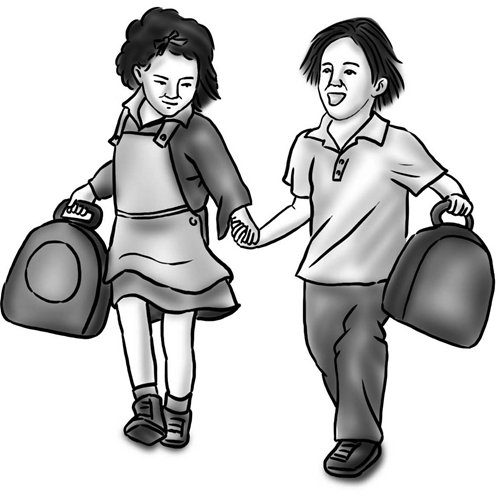METRO BEIJING / TWOCENTS-OPINION
Study abroad ‘camps’ big business

Illustrations: Xia Qing/GT
With the long and hot summer nearly over, the crowds of young travelers one often sees in China's international airports have lessened as school reopens.
The younger children usually wear the same color T-shirts and caps. Some even carry the same color school bag. The older ones, those in high school and college, are often in small groups, wearing Beats earphones, playing on their smartphones and taking selfies. They are all a part of the summer study abroad tour groups.
Their parents pay a lot of money for them to participate, but what exactly do they hope to gain?
Some study abroad tour groups are more like a holiday group. They take students to all the famous scenic spots and distinguished universities in a country. For example, in a typical American study tour group, you would start from the East coast and hit Times Square and the Statue of Liberty in New York, the Washington Monument in Washington DC, and the statue of John Harvard, the founder of Harvard University, in Cambridge Massachusetts.
Apart from visits to scenic spots, the tours would include classes at some famous universities. The truth is they just borrow some of the classrooms at these schools. Not many local students have classes during the summer, so there are many vacant classrooms. For accommodations, the students would mostly stay in a hotel, just like regular travelers.
Some study abroad tour groups allow parents to tag along with their kids, which makes the whole trip more like a holiday fiesta.
The second type is the opposite of the first.
The students stay at a school or university for the entire trip. They also take classes that are specially designed for them. For example, kids or juniors might attend a science, technology, engineering and math (STEM) camp, a scout camp, or a sports camp. High school students and above can take university courses that are specially designed for them and taught by university faculty. Intensive English, robotics and American culture are some of the subjects they might pursue. There will be some sightseeing over the weekend, but the primary focus is on studying. Most of them will stay on campus or with host families arranged by the school or university.
Surprisingly, Chinese parents tend to favor the first arrangement more. They think that with all the money they have paid, the more places their children visit, the more they will learn, and it will be worth it.
I favor the second type. The main reason for attending such camps is to learn new things about other people and topics. The best way to do so is by staying with local families and experiencing their daily lives firsthand. This is something you will never experience as a tourist staying in hotels.
Seeing a different world does not mean only visiting famous scenic spots. It is more about seeing how the locals live and experiencing their way of life.
With more Chinese parents investing heavily in their children's future, you don't need to be a genius to see that this is big business. They send their kids to these "camps" for many reasons. Some even feel peer pressure if they don't. But it would be good if they seriously considered what their children would get out of these trips before signing them up.
This article was published on the Global Times Metropolitan section Two Cents page, a space for reader submissions, including opinion, humor and satire. The ideas expressed are those of the author alone, and do not represent the position of the Global Times.
